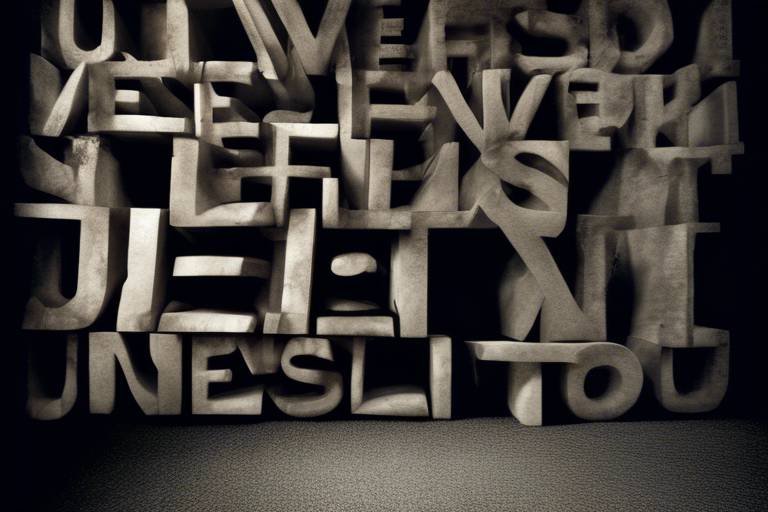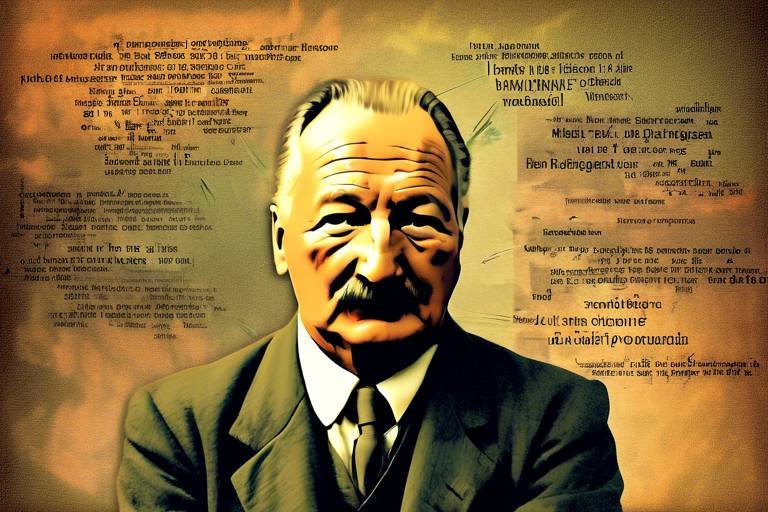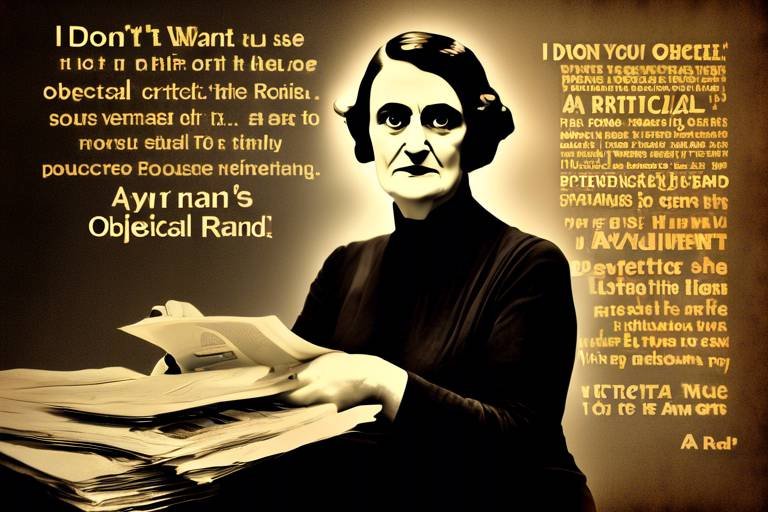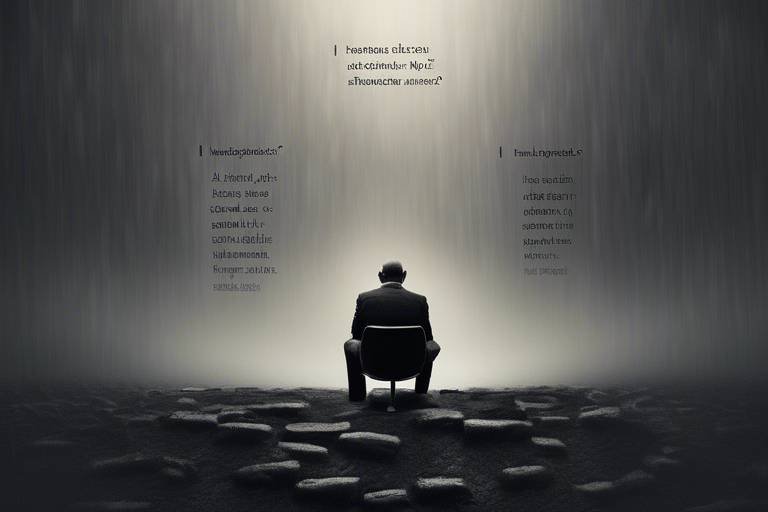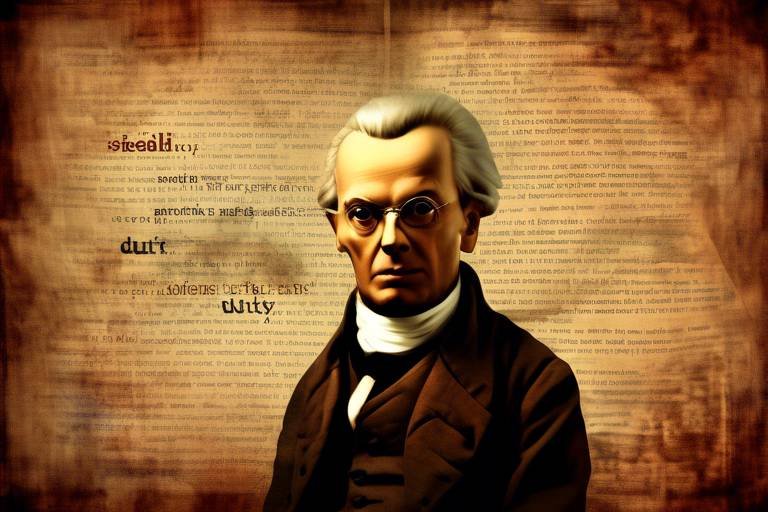The Place of God in Secular Humanism
In a world where the lines between faith and reason often blur, the relationship between secular humanism and the concept of God presents a fascinating landscape. Secular humanism, at its core, champions human values, reason, and ethics derived from human experiences rather than divine commandments. This philosophical stance invites us to ponder: what role does God play in a framework that prioritizes human agency? Can morality exist independently of a higher power, or is there an inherent need for some form of divine influence in our ethical considerations?
To unpack this relationship, it’s essential to recognize that secular humanism does not outright deny the existence of God; instead, it often places the emphasis on human responsibility and rational thought. This shift in focus leads to a rich tapestry of beliefs and practices that can coexist with, or even challenge, traditional religious views. For many secular humanists, the idea of God is less about a supreme being and more about the values we choose to uphold in our lives. In essence, secular humanism seeks to answer profound questions about existence, morality, and meaning without necessarily invoking a deity.
As we explore the implications of secular humanism on our understanding of God, we can identify several key perspectives:
- Atheistic View: Many secular humanists identify as atheists, believing that the absence of evidence for God means we should focus on human-centric values and ethics.
- Agnostic Perspective: Others may adopt an agnostic stance, suggesting that while the existence of God is uncertain, we can still derive meaning and morality from human experiences.
- Spiritual but Not Religious: Some individuals find a middle ground, embracing spirituality that does not align with traditional religious structures, allowing for a sense of purpose without a defined deity.
This diversity of thought highlights a significant aspect of secular humanism: the ability to foster a moral framework that is inclusive and adaptable. The absence of a singular divine authority allows for a more democratic approach to ethics, where individuals can engage in dialogue and reflection to shape their moral compass. In this context, the role of God becomes one of personal interpretation rather than a prescriptive guide.
Furthermore, the implications of secular humanism extend beyond individual beliefs. As society becomes increasingly diverse, the conversation surrounding morality and ethics evolves. Secular humanism encourages a collaborative effort to address global challenges, emphasizing shared human values over divisive religious doctrines. In this way, the place of God in secular humanism is not so much about negating faith but about exploring how human beings can find common ground in a complex world.
In conclusion, the exploration of God’s role within secular humanism reveals a rich dialogue that invites us to reconsider our understanding of morality, ethics, and meaning. It challenges us to think critically about how we derive our values and the ways in which we can coexist with differing beliefs. As we move forward, the conversation continues to evolve, reflecting the dynamic interplay between human experience and the search for understanding in a diverse world.
- What is secular humanism? Secular humanism is a philosophical stance that emphasizes human values and reason, advocating for ethical frameworks based on human experiences rather than religious beliefs.
- Does secular humanism deny the existence of God? Not necessarily. While many secular humanists identify as atheists, others may be agnostic or spiritual, focusing on human-centric values.
- How does secular humanism approach morality? Secular humanism derives morality from human experiences and rational thought, encouraging dialogue and reflection to shape ethical frameworks.
- Can secular humanism coexist with religion? Yes, secular humanism can coexist with various religious beliefs by promoting shared human values and fostering respectful dialogue.

The Definition of Secular Humanism
Secular humanism is more than just a philosophical stance; it’s a vibrant worldview that places human values and reason at the forefront, often in stark contrast to traditional religious beliefs. At its core, secular humanism champions the idea that individuals can lead ethical and fulfilling lives based on rational thought and human experience rather than divine guidance or religious doctrine. This perspective encourages people to seek meaning and purpose through their own abilities and the shared experiences of humanity, fostering a sense of community and cooperation among individuals.
One of the key principles of secular humanism is the emphasis on critical thinking. This involves questioning accepted norms and beliefs, advocating for a scientific approach to understanding the world, and promoting the idea that knowledge should be based on evidence and reason. In secular humanism, morality is not dictated by sacred texts or religious authorities; instead, it is derived from human experiences and the consequences of actions within the context of society. This allows for a more adaptable and evolving moral framework that can respond to the changing needs and challenges of humanity.
Moreover, secular humanism encourages individuals to take responsibility for their own lives and the world around them. By rejecting the notion of a predetermined divine plan, secular humanists advocate for personal agency and the power of human beings to effect change. This philosophy aligns with the belief in human rights and the importance of social justice, as it recognizes the inherent dignity and worth of every person. In essence, secular humanism provides a robust framework for understanding our place in the universe, empowering individuals to create meaning and purpose in their lives without reliance on supernatural explanations.
In summary, secular humanism is a dynamic and evolving philosophy that seeks to affirm human dignity, promote ethical living based on reason, and foster a sense of global responsibility. It embraces the idea that we can find meaning and morality through our shared human experiences, making it a compelling alternative to traditional religious frameworks. As we navigate the complexities of modern life, secular humanism offers a lens through which we can view our ethical obligations and our potential for growth and understanding.

The Historical Context
Understanding the historical roots of secular humanism is crucial to grasp its significance in today's philosophical landscape. Secular humanism did not emerge in a vacuum; rather, it is the product of centuries of intellectual evolution, often challenging the prevailing religious dogmas of its time. Its roots can be traced back to the Renaissance and Enlightenment periods, which were characterized by a newfound emphasis on reason, individualism, and empirical evidence. This shift in thinking laid the groundwork for a worldview that prioritized human experience and rational thought over divine authority.
During the Renaissance, thinkers began to revive classical ideas from ancient Greece and Rome, emphasizing human potential and achievements. This was a time when art, science, and philosophy flourished, and the notion that humans could shape their destiny gained traction. Figures like Leonardo da Vinci and Michelangelo celebrated human creativity, while philosophers began to question the absolute truths posited by religious institutions.
Fast forward to the Enlightenment, and we see a more systematic challenge to traditional beliefs. Intellectual giants such as Immanuel Kant and David Hume pushed the boundaries of thought, advocating for reason as the primary source of authority. They argued that human beings, equipped with reason, could arrive at moral and ethical conclusions without the need for divine intervention. This intellectual rebellion not only questioned religious doctrines but also inspired a broader movement towards human rights and social justice.
Key figures in secular humanism emerged during this period, each contributing to the development of a worldview that emphasized human values. For instance, Bertrand Russell was a prominent advocate for rational thought and skepticism towards religious beliefs. He famously stated, “The good life is one inspired by love and guided by knowledge.” His work challenged the moral authority of religion, suggesting that ethical principles could be derived from human experience rather than sacred texts.
Moreover, the Enlightenment's influence extended beyond philosophy into the sciences. The rise of scientific inquiry provided a framework for understanding the universe that did not rely on the supernatural. Discoveries in fields such as biology, physics, and astronomy began to paint a picture of a world governed by natural laws rather than divine intervention. This scientific perspective further reinforced the secular humanist belief that humans could seek knowledge and meaning through inquiry and reason.
In summary, the historical context of secular humanism is deeply intertwined with the cultural and intellectual revolutions of the Renaissance and Enlightenment. These periods not only challenged the status quo of religious authority but also laid the groundwork for a philosophy that values human experience, reason, and ethical conduct independent of divine command. As we explore the implications of secular humanism in contemporary society, it becomes evident that its roots continue to influence our understanding of morality, ethics, and the human condition.

When diving into the rich tapestry of secular humanism, it's impossible to overlook the significant contributions of a few key figures who have shaped its ideology and principles. These thinkers not only challenged the status quo but also illuminated paths of thought that prioritize human experience and rationality over divine authority. Among these luminaries, Bertrand Russell and John Dewey stand out as pivotal voices in the birth and evolution of secular humanist thought.
Bertrand Russell, a British philosopher and logician, was a fierce advocate for reason and scientific inquiry. His works, such as The Problems of Philosophy and Why I Am Not a Christian, argue that religious beliefs often stem from unexamined traditions and emotional appeals rather than rational thought. Russell believed that ethics should be grounded in human welfare and happiness, rather than divine commandments. His famous quote, “The good life is one inspired by love and guided by knowledge,” encapsulates the essence of secular humanism, emphasizing the importance of human agency and rationality in ethical decision-making.
On the other hand, John Dewey, an American philosopher and educational reformer, contributed significantly to the development of pragmatic philosophy, which aligns closely with humanistic values. Dewey argued that education should foster critical thinking and problem-solving skills, empowering individuals to navigate moral complexities without relying on religious dogma. His emphasis on experiential learning and democracy in education reflects the core tenets of secular humanism, advocating for a society where human beings can thrive through collective effort and rational discourse.
These key figures, along with others such as Albert Einstein and Sigmund Freud, have not only critiqued religious institutions but have also laid the groundwork for a moral framework that is rooted in human experience. For instance, Einstein's views on spirituality emphasize a sense of wonder about the universe, while Freud's exploration of the human psyche provides insights into the motivations behind moral behavior. Together, these thinkers highlight a crucial point: that ethical considerations can emerge from our understanding of the world and our shared human experiences, rather than from external divine commands.
In summary, the contributions of these influential philosophers have been instrumental in establishing secular humanism as a viable alternative to religious moral frameworks. By championing reason, science, and human welfare, they have paved the way for a worldview that celebrates human dignity and the potential for ethical living without the need for divine oversight. Their legacies continue to inspire contemporary discussions around morality, ethics, and the role of religion in society.
- What is secular humanism? Secular humanism is a philosophical stance that emphasizes human values and reason over religious beliefs, advocating for ethics derived from human experiences.
- Who are some key figures in secular humanism? Notable figures include Bertrand Russell, John Dewey, Albert Einstein, and Sigmund Freud, each contributing to the critique of religious institutions and the promotion of human-centered ethics.
- How does secular humanism derive its moral framework? Secular humanism bases its moral framework on human experiences, rational thought, and the well-being of individuals and societies, rather than on religious doctrines.
- Is secular humanism compatible with spirituality? While secular humanism does not rely on a traditional concept of God, many secular humanists find spirituality in human connections, nature, and the pursuit of knowledge.

The Enlightenment, a remarkable intellectual movement that flourished in the 17th and 18th centuries, played a pivotal role in shaping the landscape of secular humanism. During this era, thinkers began to prioritize reason, individualism, and empirical evidence over tradition and religious authority. Imagine a world where the shackles of dogma were slowly being unfastened, allowing for a vibrant exchange of ideas. This was the spirit of the Enlightenment, a time when people began to question the status quo and seek knowledge through observation and rational thought.
At the heart of this movement was the belief that human beings could use their intellect to understand the universe and improve their lives without the need for divine intervention. Enlightenment philosophers argued that morality could be derived from human experiences and rationality rather than religious texts. This shift laid the groundwork for secular humanism, which emphasizes the importance of human agency and ethical decision-making based on reason and empathy.
Key figures such as Immanuel Kant, Voltaire, and John Locke championed ideas that directly influenced secular humanist thought. Kant, for example, proposed the idea of the "categorical imperative," suggesting that moral actions should be based on principles that could be universally applied, rather than dictated by religious doctrine. Voltaire's sharp wit and criticism of organized religion encouraged individuals to think independently and question dogmatic beliefs. Meanwhile, Locke's theories on individual rights and the social contract laid the foundation for modern democratic thought, further embedding secular values into the fabric of society.
The Enlightenment also fostered a spirit of inquiry that led to significant advancements in science. The scientific method, emphasizing observation, experimentation, and reasoning, became a cornerstone of Enlightenment thinking. This method not only revolutionized our understanding of the natural world but also reinforced the idea that humans could derive knowledge and meaning through their own efforts. The discoveries made during this period challenged traditional religious explanations of existence and morality, paving the way for a more secular approach to ethics and human interaction.
In summary, the Enlightenment was a catalyst for the emergence of secular humanism. By championing reason, individual rights, and scientific inquiry, it encouraged a departure from reliance on religious authority. As we explore the implications of this movement, it's essential to recognize how these Enlightenment ideals continue to influence contemporary discussions around morality, ethics, and the role of human beings in shaping their destinies.
- What is secular humanism?
Secular humanism is a philosophical stance that emphasizes human values and reason over religious beliefs, focusing on ethics derived from human experience rather than divine authority. - How did the Enlightenment influence secular humanism?
The Enlightenment encouraged the use of reason, individualism, and scientific inquiry, which helped shape secular humanist thought by promoting the idea that morality and meaning can be derived from human experiences. - Who were some key figures in the Enlightenment?
Notable Enlightenment thinkers include Immanuel Kant, Voltaire, and John Locke, who contributed significantly to the development of ideas that support secular humanism. - What role does science play in secular humanism?
Science provides a framework for understanding the universe without invoking God, influencing humanist perspectives on morality and existence.

Science plays a **transformative** role in the framework of secular humanism, acting as a guiding light that illuminates our understanding of the universe. Rather than relying on divine explanations for natural phenomena, secular humanists embrace a **methodical** approach grounded in observation, experimentation, and reasoning. This shift from religious dogma to scientific inquiry is akin to moving from a dark room into the bright light of day—suddenly, everything becomes clearer and more comprehensible.
At its core, secular humanism values **evidence-based reasoning**, which allows individuals to make informed decisions about morality, ethics, and existence. The scientific method encourages a **skeptical mindset**, prompting us to question our beliefs and seek answers through rigorous investigation. For example, consider how advancements in fields such as biology, physics, and psychology have reshaped our understanding of life, the universe, and human behavior. These discoveries not only enhance our knowledge but also challenge traditional religious narratives that once dominated our worldview.
One of the most significant impacts of science on secular humanism is the way it influences our moral frameworks. Instead of deriving ethics from religious texts, secular humanists often look to the consequences of actions and the well-being of individuals and society. This approach fosters a sense of **responsibility** based on empathy and compassion rather than obedience to a divine authority. For instance, scientific studies on human behavior highlight the importance of cooperation and altruism, reinforcing the idea that we can build a **just** society based on mutual respect and understanding.
Moreover, the integration of science into secular humanism has led to a more profound appreciation for the interconnectedness of all life. As we uncover the intricate web of ecosystems and the delicate balance of nature, we are reminded of our place within the larger tapestry of existence. This realization can evoke a sense of **wonder** and **awe**, often described as a spiritual experience, even for those who do not subscribe to traditional religious beliefs. The beauty of a starry night or the complexity of a single cell can inspire a profound sense of meaning in life, independent of any notion of God.
In summary, the role of science in secular humanism is not merely about replacing religious explanations with empirical data; it is about fostering a mindset that values inquiry, compassion, and a deep respect for the natural world. As we continue to explore the mysteries of existence through scientific discovery, we find that the search for knowledge can be a **powerful** source of inspiration and ethical guidance. The marriage of science and humanism encourages us to embrace our shared humanity, creating a more enlightened and connected society.
- What is secular humanism? Secular humanism is a philosophical stance that emphasizes human values and reason over religious beliefs, focusing on ethics derived from human experiences rather than divine authority.
- How does science influence secular humanism? Science provides a framework for understanding the universe through observation and experimentation, shaping moral frameworks based on evidence and empathy rather than religious doctrines.
- Can secular humanists find meaning in life without God? Yes, many secular humanists find meaning through connections with others, appreciation for nature, and the pursuit of knowledge, viewing these experiences as sources of inspiration and fulfillment.
- What are common criticisms of secular humanism? Critics often argue that secular humanism lacks a moral foundation, but proponents contend that ethics can be derived from human experiences and rational thought.
- What is the future of secular humanism? The future of secular humanism will likely involve ongoing dialogues with religious communities, as well as adapting to technological advancements and societal changes.

When we dive into the world of secular humanism, one of the most intriguing aspects we encounter is its approach to ethics. Unlike traditional religious frameworks that often rely on divine commandments as the basis for morality, secular humanism advocates for a more human-centered perspective. This means that morality is derived from human experiences, rational thought, and a shared understanding of what it means to be human. But what does this really look like in practice?
At its core, secular humanism posits that ethical decisions should be made based on the consequences they have on human welfare and happiness. This approach is often summarized by the principle of utilitarianism, which suggests that actions are right if they promote the greatest happiness for the greatest number of people. However, it's not just about happiness; it's also about justice, fairness, and empathy. In essence, secular humanists believe that we can create a moral framework that is not only effective but also deeply compassionate.
One of the fascinating aspects of secular humanism is how it encourages individuals to engage in ethical reasoning. Instead of simply following rules handed down by religious authorities, secular humanists are encouraged to think critically about their values and the implications of their actions. This process often involves considering questions such as:
- What impact will my actions have on others?
- How can I contribute to the well-being of my community?
- What principles should guide my decisions in complex situations?
Moreover, secular humanism emphasizes the importance of dialogue and collaboration in ethical discussions. By engaging with diverse perspectives, secular humanists can refine their understanding of morality and adapt their ethical frameworks to better address contemporary issues. This open-mindedness is crucial in a world that is increasingly interconnected and multicultural.
However, the ethical implications of secular humanism are not without challenges. Critics often argue that without a divine moral authority, secular humanism lacks a solid foundation for morality. They contend that this could lead to moral relativism, where anything can be justified based on personal or societal preferences. In response, secular humanists assert that a rational and empathetic approach to ethics can provide a robust framework that is both flexible and grounded in a commitment to human dignity.
In conclusion, the ethical implications of secular humanism are profound and multifaceted. By prioritizing human welfare, encouraging critical thinking, and fostering open dialogue, secular humanism offers a compelling alternative to traditional religious moral frameworks. It challenges us to consider not just what is right or wrong, but why we believe that to be the case, ultimately leading to a more thoughtful and compassionate society.
- What is secular humanism? Secular humanism is a philosophical stance that emphasizes human values and reason, prioritizing them over religious beliefs.
- How do secular humanists derive their ethics? Secular humanists derive their ethics from human experiences, rational thought, and the consequences of actions on human welfare.
- Is secular humanism anti-religious? While secular humanism critiques religious dogmas, it is not inherently anti-religious; it promotes a human-centered approach to ethics.
- What are some criticisms of secular humanism? Critics argue that it lacks a foundation for moral authority and can lead to moral relativism, but secular humanists counter that rational and empathetic reasoning provides a solid ethical framework.

When we dive into the intricate relationship between God and secular humanism, we find ourselves at a fascinating crossroads of belief and reason. Secular humanism, at its core, is a worldview that emphasizes human values, ethics, and reason, often stepping away from traditional religious frameworks. But how does this philosophical stance view the concept of God? Is there room for spirituality and meaning in a life devoid of divine authority? These are questions that not only intrigue scholars but also resonate with many individuals navigating their own beliefs.
Secular humanists often adopt atheistic or agnostic perspectives, which fundamentally shape their understanding of existence. Atheists outright reject the notion of a deity, believing that the universe operates on natural laws and human experiences. On the other hand, agnostics maintain that the existence of God is unknown or unknowable, leaving them open to various interpretations about the meaning of life and morality. This divergence leads to a rich tapestry of thought on spirituality, where secular humanists find meaning through human connections, experiences, and the pursuit of knowledge.
Interestingly, many secular humanists argue that morality does not require a divine source. Instead, they suggest that ethical principles arise from human experiences and rational thought. This raises an important point: can we derive a moral compass without referencing a higher power? The answer, according to many humanists, is a resounding yes. They believe that empathy, compassion, and a shared human experience can guide moral decisions, allowing for a more nuanced understanding of ethics that evolves with society.
To illustrate this relationship further, consider the following table that contrasts the perspectives of secular humanism with traditional religious views:
| Aspect | Secular Humanism | Traditional Religion |
|---|---|---|
| Source of Morality | Human experience and reason | Divine command |
| View of God | Agnostic or atheistic | Belief in a deity |
| Meaning of Life | Constructed through relationships and knowledge | Gifted by a higher power |
| Ethical Framework | Flexible and evolving | Fixed and absolute |
This table highlights the fundamental differences in how secular humanism and traditional religions approach the concept of morality and existence. While secular humanists may not adhere to a fixed set of beliefs, they find strength in the adaptability and evolution of their ethical frameworks, allowing them to respond to the complexities of modern life.
Despite these differences, there remains a dialogue between secular humanists and religious communities. Many secular humanists advocate for a respectful coexistence, recognizing that both perspectives can contribute to a richer understanding of human experience. In fact, some argue that the absence of a belief in God can lead to a more profound appreciation for life itself, as it encourages individuals to take responsibility for their actions and their impact on others.
In conclusion, the relationship between God and secular humanism is multifaceted and deeply thought-provoking. While secular humanism may challenge traditional religious beliefs, it also opens up new avenues for understanding morality, ethics, and the meaning of life. As society continues to evolve, so too will the conversations surrounding these themes, creating a landscape rich with opportunities for dialogue and growth.
- Can secular humanism coexist with religious beliefs? Yes, many secular humanists advocate for respectful coexistence and dialogue with religious communities.
- How do secular humanists derive their moral values? They derive their moral values from human experiences, empathy, and rational thought rather than religious doctrines.
- Is secular humanism a belief system? It is more of a philosophical stance than a belief system, emphasizing reason and human values over divine authority.

Secular humanism, while celebrated for its emphasis on reason and human values, is not without its critics. Many argue that it presents a flawed framework for understanding morality and ethics. One of the primary critiques is that secular humanism lacks a definitive source of moral authority. Without the guidance of a divine being or religious text, how do secular humanists determine what is right or wrong? This question often leads to a deeper examination of the foundations upon which humanist ethics are built.
Critics assert that secular humanism relies heavily on subjective human experiences, which can vary greatly from person to person. For instance, what one individual may deem ethical could be viewed as immoral by another. This subjectivity raises concerns about the consistency and universality of moral principles within a secular framework. In contrast, religious doctrines often provide a clear set of guidelines that followers can adhere to, potentially offering a more stable moral compass.
Furthermore, some argue that secular humanism may inadvertently lead to nihilism, a belief that life lacks objective meaning, purpose, or intrinsic value. If everything is based on human experience and reason, what happens when those experiences are negative or when rational thought leads to despair? Critics worry that without a higher purpose, individuals might struggle to find motivation or meaning in their lives.
Another notable critique centers around the idea of community and shared values. Traditional religions often foster a sense of belonging and community among their followers. In contrast, secular humanism can sometimes feel isolating, as it encourages individuals to rely on their own reasoning rather than a collective belief system. This can lead to a fragmented society where shared values are hard to come by, potentially resulting in a lack of social cohesion.
However, proponents of secular humanism respond to these critiques by emphasizing the importance of rational discourse and the adaptability of humanist ethics. They argue that morality can evolve through collective human experience and dialogue, allowing for a more inclusive understanding of ethics that reflects diverse perspectives. Moreover, many secular humanists engage in community-building activities and promote shared values through cooperative efforts, demonstrating that a sense of belonging is still achievable without religious affiliation.
In conclusion, while critiques of secular humanism highlight valid concerns, they also open the door for meaningful discussions about morality, community, and the human experience. The ongoing dialogue between secular humanists and their critics is essential for refining ethical frameworks and enhancing our understanding of what it means to live a good life in a complex world.
- What is secular humanism? Secular humanism is a philosophical stance that emphasizes human values and reason over religious beliefs, focusing on ethics derived from human experiences.
- Does secular humanism provide a moral framework? Yes, secular humanism offers a moral framework based on rational thought and human experiences, although it lacks a definitive source of moral authority like religious doctrines.
- Can secular humanism lead to nihilism? Some critics argue that it can, as it questions the existence of objective meaning or purpose. However, many secular humanists find meaning through human connections and experiences.
- How do secular humanists build community? Secular humanists often engage in community-building activities, promoting shared values through cooperative efforts, discussions, and social initiatives.

As we stand on the brink of a new era, it's fascinating to consider the future of secular humanism. This philosophical movement, which emphasizes human values and rational thought over religious dogma, is evolving in response to the rapid changes in society. One of the most significant factors influencing this evolution is technology. With advancements in artificial intelligence, biotechnology, and communication, the way we understand ourselves and our place in the universe is being reshaped. This raises a crucial question: how will secular humanism adapt to these changes?
To begin with, the rise of technology has opened up new avenues for human connection and understanding. Social media platforms and online communities allow secular humanists to share ideas, collaborate on projects, and engage in meaningful dialogue across geographical boundaries. This interconnectedness fosters a sense of global citizenship, where individuals can unite over shared human experiences rather than religious affiliations. However, it also presents challenges, such as the spread of misinformation and the potential for echo chambers that can stifle diverse perspectives.
Moreover, the integration of technology into daily life is prompting a reevaluation of ethical frameworks. As we face dilemmas related to privacy, artificial intelligence, and genetic engineering, secular humanists are tasked with developing moral guidelines that reflect our shared humanity. This is where the importance of critical thinking comes into play. By prioritizing reason and evidence-based approaches, secular humanists can navigate these complex issues without relying on outdated religious doctrines.
Another significant aspect of the future of secular humanism is its relationship with religious communities. As secularism gains traction, there is a growing need for dialogue and collaboration between secular humanists and religious believers. This does not mean that secular humanists must abandon their principles; rather, it offers an opportunity to work together on common goals, such as social justice, environmental sustainability, and human rights. By finding common ground, both groups can contribute to a more equitable and compassionate society.
As secular humanism continues to evolve, it is essential to remain open to new ideas and perspectives. The movement must embrace diversity, incorporating voices from various cultural and social backgrounds. This inclusivity will enrich the humanist discourse and ensure that it remains relevant in an increasingly complex world. After all, the essence of secular humanism lies in the belief that every individual has inherent worth and the capacity for reason.
In conclusion, the future of secular humanism is not set in stone; it is a dynamic and evolving landscape shaped by technology, ethics, and collaboration. As we navigate the challenges and opportunities ahead, embracing a human-centered approach will be crucial in fostering a society that values reason, compassion, and shared humanity.
- What is secular humanism? Secular humanism is a philosophical stance that emphasizes human values and reason over religious beliefs, focusing on ethics derived from human experiences.
- How does technology influence secular humanism? Technology fosters global connectivity, enabling collaboration and dialogue among secular humanists while also posing ethical challenges that require careful consideration.
- Can secular humanists work with religious communities? Yes, secular humanists can engage in dialogue and collaboration with religious communities on shared goals such as social justice and environmental sustainability.
- What are the ethical implications of secular humanism? Secular humanism encourages individuals to derive morality from human experiences and rational thought rather than relying on divine authority.
Frequently Asked Questions
- What is secular humanism?
Secular humanism is a philosophical viewpoint that emphasizes human values, reason, and ethics, independent of religious beliefs. It promotes the idea that humans can lead meaningful lives and make moral decisions based on reason and empathy rather than divine authority.
- How did secular humanism originate?
Secular humanism emerged during the Renaissance and Enlightenment periods when thinkers began to challenge traditional religious dogmas. This movement was characterized by a focus on human reason, individualism, and scientific inquiry, paving the way for a more secular approach to morality and ethics.
- Who are some key figures in secular humanism?
Prominent figures in secular humanism include philosophers like Bertrand Russell and John Dewey. These thinkers contributed significantly to the development of humanist thought, advocating for rationality and critiquing the influence of religious institutions on society.
- What role does science play in secular humanism?
Science is fundamental to secular humanism as it provides a framework for understanding the universe without relying on the concept of God. Scientific discoveries help shape humanist perspectives on morality, existence, and the nature of reality, reinforcing the belief in human reason.
- How do secular humanists derive their ethics?
Secular humanists derive their ethical frameworks from human experiences, rational thought, and empathy rather than religious doctrines. They believe in creating moral guidelines based on the well-being of individuals and society as a whole, emphasizing the importance of context and consequences.
- What is the relationship between God and secular humanism?
Secular humanism generally views the concept of God through atheistic or agnostic lenses. This perspective often leads to discussions about spirituality and meaning in life that do not rely on traditional religious beliefs, encouraging individuals to find their own sources of purpose and fulfillment.
- What are some common critiques of secular humanism?
Critics often argue that secular humanism lacks a foundation for moral authority, suggesting that without a divine source, morality becomes subjective. However, humanist thinkers counter that morality can be grounded in human experiences and rational discussions about well-being and justice.
- What does the future hold for secular humanism?
The future of secular humanism is shaped by ongoing societal changes, technological advancements, and dialogues with religious communities. As secular humanism evolves, it continues to address contemporary challenges while advocating for human rights, social justice, and ethical living.



